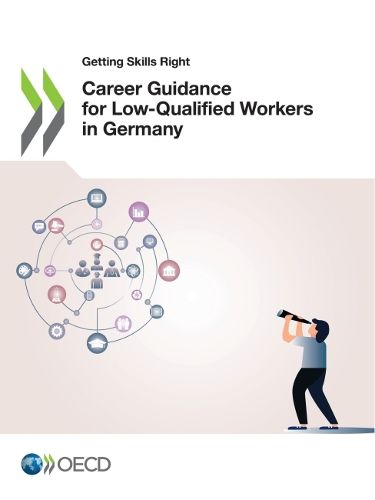Readings Newsletter
Become a Readings Member to make your shopping experience even easier.
Sign in or sign up for free!
You’re not far away from qualifying for FREE standard shipping within Australia
You’ve qualified for FREE standard shipping within Australia
The cart is loading…






This title is printed to order. This book may have been self-published. If so, we cannot guarantee the quality of the content. In the main most books will have gone through the editing process however some may not. We therefore suggest that you be aware of this before ordering this book. If in doubt check either the author or publisher’s details as we are unable to accept any returns unless they are faulty. Please contact us if you have any questions.
In Germany, the three ‘Ds’, Digitalisation, Decarbonisation and Demographic change, are dominating the headlines. Countless studies analyse the impact of these megatrends on the world of work and document how job profiles are changing. The growing demand for high-level cognitive skills and complex social interaction skills is challenging particularly low-qualified workers. In response to these trends, many countries have developed career guidance programmes to support individuals and companies in navigating career options and sustainable job transitions. However, low-qualified workers are less likely to receive career guidance than those with higher qualifications and even those who are unemployed due to a range of multi-layered and interconnected barriers. The report first gives an overview of career guidance provision at the federal level in Germany and then describes career guidance needs and provision in the states of Berlin and North Rhine-Westphalia (NRW). It reviews the support that low-qualified workers have access to, where learning could serve in other regions and at the national level and provides recommendations on how provision for this group can be strengthened
$9.00 standard shipping within Australia
FREE standard shipping within Australia for orders over $100.00
Express & International shipping calculated at checkout
Stock availability can be subject to change without notice. We recommend calling the shop or contacting our online team to check availability of low stock items. Please see our Shopping Online page for more details.
This title is printed to order. This book may have been self-published. If so, we cannot guarantee the quality of the content. In the main most books will have gone through the editing process however some may not. We therefore suggest that you be aware of this before ordering this book. If in doubt check either the author or publisher’s details as we are unable to accept any returns unless they are faulty. Please contact us if you have any questions.
In Germany, the three ‘Ds’, Digitalisation, Decarbonisation and Demographic change, are dominating the headlines. Countless studies analyse the impact of these megatrends on the world of work and document how job profiles are changing. The growing demand for high-level cognitive skills and complex social interaction skills is challenging particularly low-qualified workers. In response to these trends, many countries have developed career guidance programmes to support individuals and companies in navigating career options and sustainable job transitions. However, low-qualified workers are less likely to receive career guidance than those with higher qualifications and even those who are unemployed due to a range of multi-layered and interconnected barriers. The report first gives an overview of career guidance provision at the federal level in Germany and then describes career guidance needs and provision in the states of Berlin and North Rhine-Westphalia (NRW). It reviews the support that low-qualified workers have access to, where learning could serve in other regions and at the national level and provides recommendations on how provision for this group can be strengthened